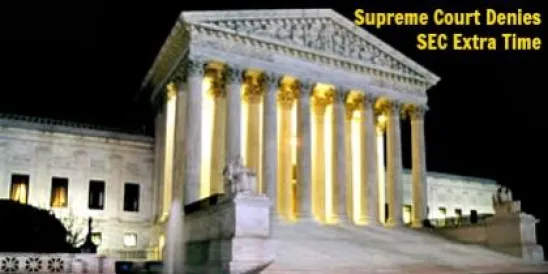The US Supreme Court recently held that the Securities and Exchange Commission has five years from the date an alleged fraud occurs, not from the date of its discovery, to bring an enforcement action for civil penalties.
In Gabelli et al. v. Securities and Exchange Commission, the SEC claimed that two officials (Petitioners) at Gabelli Funds, LLC aided and abetted violations of the Investment Advisers Act of 1940, and sought civil penalties. The agency alleged that the improper conduct occurred from 1999 through 2002, but did not file its complaint until 2008. Petitioners moved to dismiss the claim, arguing that it was time-barred under the five-year statute of limitations. Petitioners claimed that the statute of limitations began running at the time of the alleged offense, and the SEC argued that it ran from the time the SEC “discovered” the wrongdoing.
The Supreme Court found that the SEC enforcement action accrued when the violations occurred, not when the SEC discovered them. The Court distinguished the SEC from the private plaintiff for whom the discovery rule originally evolved to protect. A private plaintiff may not know whether he has been wronged until well after the conduct occurs, and needs the extra time the discovery rule provides. In contrast, the SEC is an agency whose “very purpose” is to root out fraud, and has sufficient tools to do so. Thus, the Court declined to extend the “discovery” rule to the SEC’s action.
Gabelli et al. v. Securities and Exchange Commission, 568 U.S. __ (2013).




 />i
/>i

